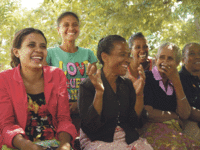World News
Anna Robertson
1 November 2012
 Tara D’Sousa and Anna Robertson of Caritas Aotearoa New Zealand travelled to Timor Leste to assess progress on some long-term development programmes. Here Anna Robertson explores the situation for women and bridge-building work through radio.
Tara D’Sousa and Anna Robertson of Caritas Aotearoa New Zealand travelled to Timor Leste to assess progress on some long-term development programmes. Here Anna Robertson explores the situation for women and bridge-building work through radio.
Her dress reminiscent of a past Portuguese era, Mana Norberta is clearly a bit of a character. She meets us with other members of the Buruma women’s group under a tree.
The group is part of the Hafoti women’s network that helps with loans, training and marketing advice for small enterprise development. As Mana Norberta talks loudly and gestures wildly, the others laugh.
Mana Norberta has been a member of the Buruma women’s group in Baucau district from its beginning. She plants and harvests rice in the local rice paddies as well as tending to her large vegetable garden and selling the produce in the local market. In her spare time she helps to produce fried banana chips and virgin coconut oil. These are packaged and sent to the Timor Leste capital Dili to sell through the Hafoti shop and supermarket outlets.
Another member of the group, Mana Joanna, says she takes her vegetables by bus fortnightly to sell in Dili for a better price than she could get in Baucau.
When asked why she chose to sell in the local market instead of seeking a better price, she says,
‘When would she have time to take them to Dili? If she was away, who was going cook and clean for her husband? And what about all the other household tasks that needed to be done, who would do them?’
Her husband seemed quiet and less demanding than her tirade had indicated, but her point about the many demands on her time was valid.
Mana Norberta spoke of a real concern over development for women. An increase in economic opportunities leads to a heavier work load for women. Their decisions on where and when to sell are not made purely on economic terms. They also consider women’s ability to make decisions within the family; the juggling of childcare, cooking and cleaning as well as planting, tending and harvesting.
Women in Timor Leste play a crucial role in community life and in the reconstruction of the country, but their work is often unpaid and under-valued. Cultural and political structures sideline women from decision-making particularly in local government. However, progress has been made at the national level: in the elections earlier this year, 671 women represented 21 political parties.
But Timorese women are demanding a more meaningful participation in a historically patriarchal society. The next five-year parliamentary term is looking at decentralisation reforms to build stronger local government. At the local council election, 28 percent of all elected officials were women but only 11 of the 442 chefe de suco (local council heads) are women. Women-specific civil society organisations, such as Hafoti, can create an important platform for improving women’s status.
Hafoti brings together about 20 women’s groups in an umbrella network, implementing a grassroots community development programme guided by the members themselves. Members serve as elected board members and other members work as field staff. This approach places decision-making power in the hands of members: they decide how the organisation is run, what products are made, how much is made and how the profit is distributed in the group or whether they save it together.
Women can advance their own economic development as best suits them and in the process develop strong leadership abilities by participating in the democratic processes of the network. The mid-term benefits of the network include increased income to meet household needs and cover education costs for their children.
The Hafoti women’s network is bringing positive change for women in Timor, and can have ripple effects beyond the network itself. Developing women’s leadership through the network can empower them within the community, as well as within local and national government.
It could enhance the role of women in politics from being merely descriptive to meaningful participation.
Click here and here for the activities of Catholic broadcasting in Timor Leste.
Image: Mana Norberta (centre) with other members of the Buruma women’s group. Photo: Anna Robertson/Caritas